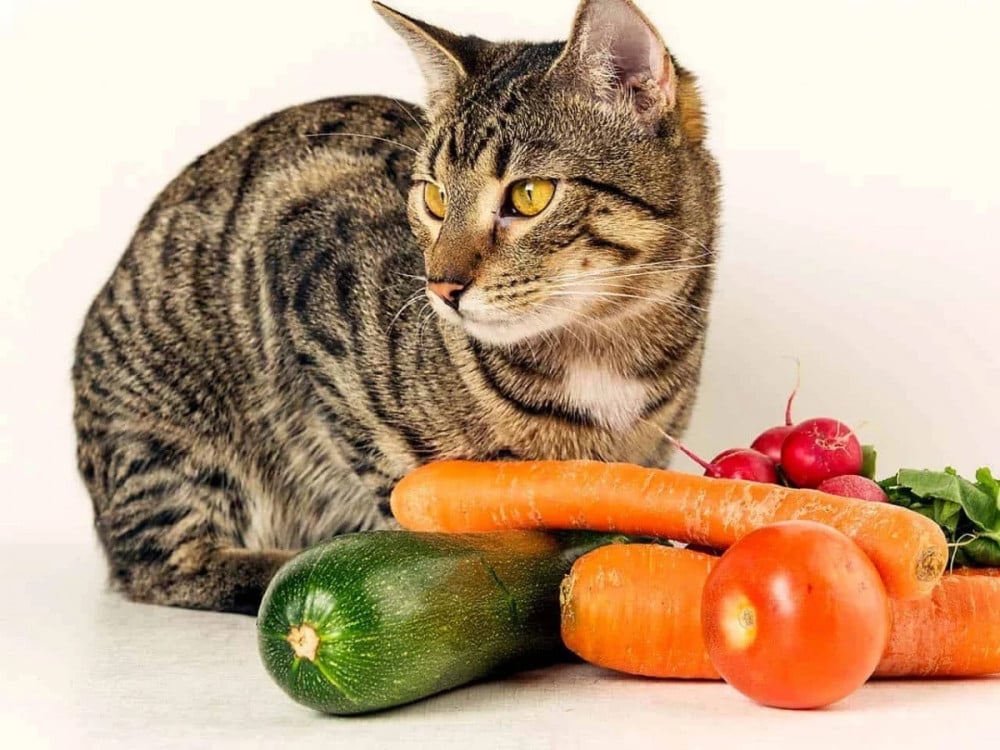Cats are carnivores, so it is important to realize that meat is their primary food. However, some types of vegetables or fruits can be added to the cat’s diet from time to time to help with digestion, bowel movement, and treat constipation in the cat, but without relying on them completely. ; Despite the availability of many vitamins, minerals, and fiber in vegetables, the cat’s digestive system cannot absorb certain types of plant fiber, which may cause disorders, and in this article we will mention some vegetables that cats can eat.
What vegetables are suitable for cats?
Below is a list of the most prominent vegetables that can be offered to cats:
Carrots: Carrots are a healthy choice for the cat, as they are rich in vitamins and low in calories, but it is important to serve them fresh to avoid the cat choking.
Cucumber: Cucumber is low in carbohydrates and fat and rich in vitamins and minerals, which makes it suitable as a snack for your cat.
Sweet potatoes: Cats can eat sweet potatoes, but in small quantities, because they contain solanine, which is harmful to the cat when present in large quantities.
Green beans: Cooked green beans contain a good percentage of iron and protein, which makes them suitable for cats.
Broccoli: Some cats may enjoy eating raw or cooked broccoli, but it is important to avoid serving it in large quantities, as excess of it may cause problems with cat digestion.
Spinach: It is full of minerals and vitamins that are beneficial to the cat, but it should be avoided if the cat suffers from kidney problems.
Sweet pepper: It is rich in antioxidants and fiber, and can be served to the cat by cooking it, or cutting it into small parts.
Cabbage: Cabbage can help maintain a healthy digestive system and improve the cat’s coat. It can also be served to the cat by cutting or cooking it.
Other vegetables: peas, squash, lettuce, cauliflower, celery, and zucchini.
What vegetables are harmful to cats?
There are some types of vegetables that are toxic to cats, such as: Onions and chives, because they contain compounds that dissolve the blood of cats and break down their red blood cells, in addition to causing symptoms of poisoning. Such as diarrhea, vomiting, and cramps. Some types of vegetables may also cause digestive problems in the cat, such as; Tomatoes: Although providing fresh tomatoes in moderate quantities to cats may not cause harm to them, if a cat eats their leaves or stems, or eats them before their fruits are ripe, it may be toxic to them, so it is preferable to avoid tomatoes in the cat’s diet.
Are vegetables given fresh or cooked to the cat?
Vegetables can be served to the cat fresh after making sure they are washed well, then cut them into small portions, steam them, or mash them with the cat’s basic food, while avoiding cooking them with oils and fats or adding spices to them. It is also worth noting that cats are temperamental with vegetables, and may not like them. Some cats never eat vegetables or even fruits.
What is the right amount of vegetables for cats?
In fact, cats do not need vegetables in their diet, as they can live by eating meat only, but small quantities of vegetables, not exceeding 10% of their diet, can be beneficial for the digestion process, and it is not recommended to provide vegetables to the cat daily, but rather as one meal. One week within the number of cat meals is sufficient for her.

